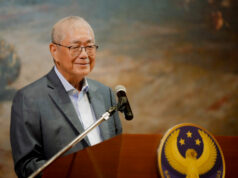DICT studying higher fees to force return of underused frequency
THE Department of Information and Communications Technology (DICT) said it is studying raising user fees for under-utilized frequency owned by telecommunications companies.
DICT Acting Secretary Eliseo M. Rio, Jr. told reporters on the sidelines of the government’s first formal public hearing on the selection of a so-called “third player” for telecommunications on Thursday that the government will review all frequency held by companies.
“Those that are not being used, we may try to take back,” he said.
He noted that while the distribution of frequency is administrative, withdrawal of frequency is quasi-judicial, and may end up being determined in court.
“We are thinking of ways to make the withdrawal of frequency administrative too. For example, we could raise the spectrum user fee for the frequency that is not being used. It becomes uneconomical for them to hold on to that. That’s one of the things we could do,” Mr. Rio said.
The spectrum user fee is an annual payment that is based on the amount of spectrum, type of service and economic classification of the areas covered by a telco provider.
The DICT head said some of these frequencies may be owned by Globe Telecom, Inc. and Smart Communications, Inc., but there are also some owned by smaller firms.
“This is a matter of how much frequency you were given vis-a-vis your traffic. How many subscribers are using it? If that’s too low, it means you are not using it efficiently. Therefore we could say what frequency is good enough for your number of subscribers in the present or in the near future… That’s what we’ll add spectrum user fee to, so the companies will be forced to return the frequencies,” he said.
He said the DICT is consulting with the International Telecommunication Union (ITU) on best practices for frequency review.
“We are also advocating for an equitable distribution of frequency as a law… If it’s a law, it would be stronger. But even before that law can be enacted, then this is the plan (for) how to more or less distribute these frequencies more equitably than what it is now.”
Asked if the government plans to reassign frequency to the third player, Mr. Rio said the DICT is open to the idea, but added that the frequency on offer in the draft terms of reference is sufficient.
“Our point is the frequency available is interesting enough for potential bidders,” he said.
In June, the National Telecommunications Commission (NTC) said around 30.32% of the available frequency is owned by PLDT, Inc., which operates Smart Communications. Globe Telecom, Inc. has around 24.9%. About 39.35% represent frequency that is unassigned or still subject to litigation, and 5.41% is unallocated.
Hastings Holdings, Inc., a unit of PLDT Beneficial Trust Fund subsidiary MediaQuest Holdings, Inc., has a stake in BusinessWorld through the Philippine Star Group, which it controls. — Denise A. Valdez



